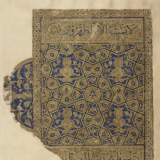History of surah The Night Journey

Name
From verse 1, this Surah gets its name, "The Night Journey." However, unlike the titles of many other Surahs, this name is only a distinguishing appellation and not a descriptive title; it does not imply that the theme of this Surah is "The Night Journey."
Period of Revelation
According to the opening verse, this Surah was revealed on the occasion of Mi'raj (Ascension).
The traditions and biographies of the Holy Prophet indicate that this occurrence took place a year before Hijrah. Thus, this Surah is one of those that was given at Makkah during the latter phase of Prophethood.
Background
For the previous twelve years, the Holy Prophet had been promoting Tauhid, and his opponents had been doing everything they could to prevent the success of his Mission. Despite all of their efforts, however, Islam had spread to every region of Arabia, and there were hardly any tribes that had not been influenced by his invitation.
The devout believers had established a little group in Makkah and were prepared to take on any threat to the success of Islam.
They were not the only members of Aus and Khazraj, two powerful clans in Al-Madinah, who had converted to Islam.
As a result, the Holy Prophet decided that it was time to leave Mecca and go to Medina, where he would gather the scattered Muslims and build an Islamic state.
These were the circumstances surrounding the Mi'raj, and the Holy Prophet handed down the message contained in this Surah upon his return.
Theme and Topics
This Surah is a beautiful example of caution, reproof, and instruction combined in a proportionately balanced way.
The non-Muslims of Makkah had been warned to learn from the wretched fate of the Israelites and other people and change their ways while Allah had granted them a temporary reprieve, which was about to come to an end. Therefore, they should accept the invitation being made by Muhammad (may Allah's peace and blessings be upon him) and the Quran. If not, they will be wiped out and replaced by new people. In addition, the Israelites, with whom Islam was about to come into touch directly at Al-Madinah, were forewarned to take heed from the chastisements that had previously been meted out to them. The cautioned them, "Take advantage of the Prophethood of Muhammad (Allah's peace be upon him) because that is the last opportunity which is being given to you. If even now you behave as you have been behaving, you shall meet with a painful torment."
When it comes to human education, it has been imprinted that having the proper concept of Tauhid, life after death, and Prophethood determines whether people succeed or fail, win or lose. The doubts of the unbelievers about these fundamental realities have thus been dispelled, and on appropriate occasions they have been admonished and rebuked in regard to their ways of ignorance. In this way, convincing arguments have been advanced to prove that the Quran is the Book of Allah and that its teachings are true and genuine.
In this regard, the essential moral and cultural tenets that the Islamic System of life is designed to be based upon have been advanced. Thus, this served as a type of Manifesto for the imagined Islamic state that had been announced a year before it was actually founded. The outline of the framework on which Muhammad (Allah's peace be upon him) intended to create human life, first in his own nation and subsequently in the outside world, has been made clear.
In addition to these, the Holy Prophet was told to maintain his position firmly despite the hostility and challenges he was facing and should never consider making a concession to unbelief. The Muslims who occasionally displayed indications of impatience when they encountered persecution, slander, and dishonest arguments have also been advised to deal with difficult situations with patience and fortitude while maintaining complete control over their emotions and passions. As if to say, "This is the thing which will produce in you those high qualities of character which are essential for everyone who intends to struggle in a righteous way," salat was also prescribed in order to reform and purify their spirits. In addition, legends tell us that Mi'raj was the first occasion on which it was ordained that the five daily prayers be given at specific times.